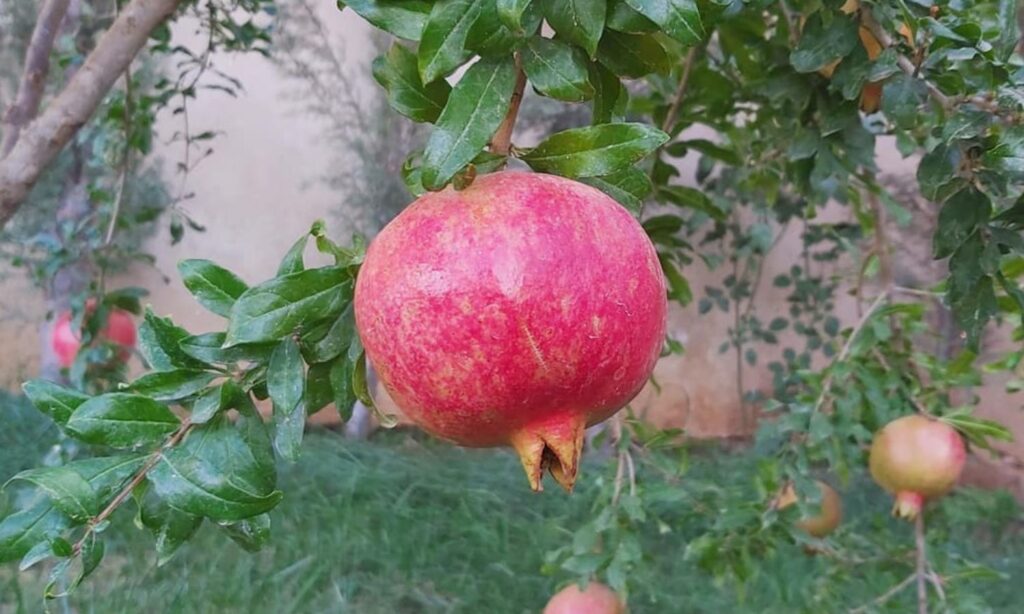Enab Baladi – Homs
At the end of last September, the process of preparing pomegranate molasses in the countryside of Homs city in central Syria became active, primarily for storage and for sale, following the harvesting of ripe pomegranates. This is a tradition passed down by locals over the years, although it has slightly declined due to rising costs and the high price and unavailability of gas.
According to information obtained by Enab Baladi from residents in the countryside of Homs, the deteriorating economic conditions and the use of pomegranate trees as firewood have negatively impacted the production of pomegranate molasses. Farmers have turned to selling their pomegranate harvest to meet other family needs.
The preparation of pomegranate molasses is a complex process requiring patience and effort. First, the pomegranate seeds must be separated from the peels, then juiced and filtered, and finally placed over a low flame for 11 continuous hours.
Winter storage
Mrs. Tufaha al-Sharqawi (63 years old) from the town of al-Rastan, north of Homs, stated that pomegranate molasses is one of the main winter storage items. Despite the high costs, preparing it at home is preferable to purchasing it from stores, as ready-packaged products are of inferior quality and do not provide the same flavor and benefits, and are often adulterated.
She added to Enab Baladi that each kilogram of pomegranate molasses requires between 8 and 11 kilograms of pomegranates, which currently sell for 6,000 Syrian pounds per kilogram (with the dollar equivalent to about 15,000 Syrian pounds).
Al-Sharqawi’s family needs between four to six kilograms of pomegranate molasses during the winter, and they use wood to prepare the molasses as it is available and cheaper than gas, with the price of a gas cylinder on the black market amounting to 275,000 Syrian pounds (containing 9 kilograms of gas).
During a market tour by Enab Baladi, the price of a kilogram of handmade pomegranate molasses reached 55,000 Syrian pounds, while the price of ready-made pomegranate molasses was 40,000 Syrian pounds.
Some individuals and families prepare molasses for sale, not just for storage. Enab Baladi observed local Facebook pages advertising pomegranate molasses for sale, offering deals and discounts for larger quantities.
Pomegranate molasses is a staple in many Syrian dishes, especially in salad and kibbeh, adding a tangy taste to the food.
Affected harvest
There are no estimates for the current season’s pomegranate production in Homs, while in 2023, it reached about 656 tons from a total cultivated area estimated at about 1,455 dunams, according to the Homs Directorate of Agriculture.
At that time, the irrigated areas for the crop covered 1,271 dunams, while the rainfed areas covered 184 dunams, with more than 48,000 trees in the irrigated area, including over 32,000 fruitful trees, and 4,675 trees in the rainfed area, with 4,635 being fruitful.
Pomegranate trees in Homs have faced some damage in recent years, most notably fires in 2020. The damage to the palm and olive groves in and around Tadmur affected 2,200 dunams alone, based on statistics from the Directorate of Agriculture.
In February, the Homs Directorate of Agriculture distributed grafted almond saplings free of charge as part of a grant allocated to the province, which included ten thousand seed and grafted almond saplings. They also distributed a thousand pomegranate and fig saplings to replace trees that had withered due to frost in the province.
Eng. Azzam Darbouli, head of the plant production division at the directorate, mentioned these saplings are frost-resistant varieties suitable for cultivation in the western and eastern countryside (Al-Mukharram, al-Sha’eirat, al-Hazza, Jub al-Jarah, and al-Shawkatliya) and are early varieties suitable for specific areas.

